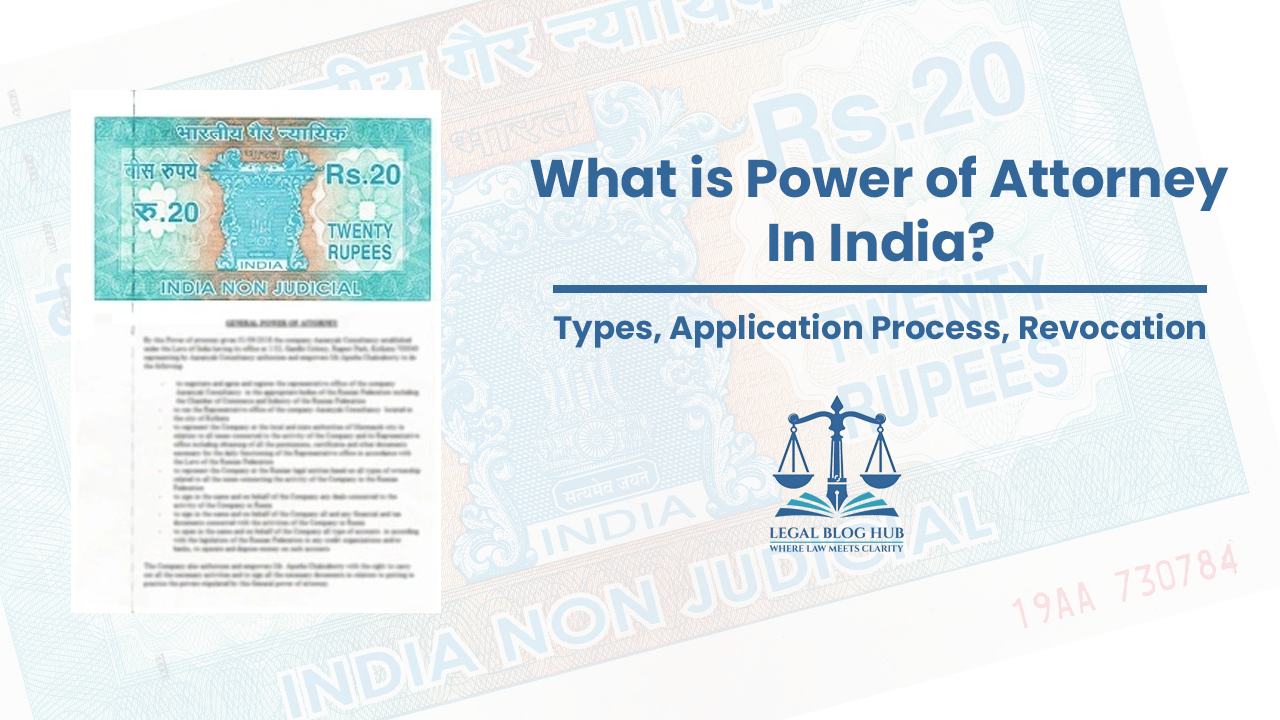Table Of Content : What is Power of Attorney In India?
While you're sick or getting older, making crucial health, money, and property decisions is very hard. So, a Power of Attorney (POA) greatly helps in such a situation. This legal document allows you to give your rights to a trustworthy person to make this decision on your behalf. Whether you're an Indian or a NRI, this Power of Attorney (POA) information will keep you prepared and stress-free.
What is the Power of Attorney?
A Power of Attorney is a legal document that allows you to choose an agent to act on your behalf regarding health, money, property, or legal matters. Power of Attorney is meant to be useful when the person cannot handle all these things by themselves or intentionally wants to give this responsibility to someone.
What are the Types of Power of Attorney?
Different types of Power of Attorney documents are available according to the requirement. You'll find the information about 6 Main kinds of POA below:
- Durable Power of Attorney: This type of Power of Attorney stays valid even if a person who gave this legal document to its agent becomes mentally unwell. This POA is valid for situations like serious illness or Old Age.
- Non-Durable Power of Attorney: This type of POA is specifically for a short time or a specific task. However, this type of Power of Attorney will become invalid when the person is mentally unfit.
- Springing Power of Attorney: This type of Power of Attorney will start working when a specific event happens, like when a person becomes sick or unable to make a decision.
- General Power of Attorney: This POA gives your agent complete control over property, money, or legal work. However, it has a limitation: It will end if the person who gave this authority becomes unwell or dies.
- Financial Power of Attorney: This type of Power of Attorney is used explicitly for financial matters like paying bills, banking, or managing investments.
- Medical Power of Attorney: This legal document allows someone to make health-related or medical decisions for you when you are unable to do so yourself.
How to get Power of Attorney?
If you want to know how to get or obtain power of attorney, follow these simple steps.
- Choose the right type of POA: First, decide which type of power of attorney suits you per your requirements, like medical, financial, general POA, etc.
- Pick someone you trust: Choose a trusted member you can rely on.
- Write the POA document: You need to hire a lawyer to create this document for this requirement.
- Mention what powers the person will have: You should be clear about the authorities you're providing to your agent.
- Sign it with witnesses: After creating the document, you and two witnesses must sign the POA. One thing needs to be taken care of: the witness can't be your agent.
- Get it notarized: You must go to the public notary to get this document officially stamped.
- Register it if needed: If your power of attorney legal document is related to the property, you must register it at the local Sub-Registrar Office.
- Share copies: After you’ll get your power of attorney, you need to share a copy with your agent and keep one copy with you. Whenever it is required, you also need to share a copy of this legal document with your bank or office.
how much does a power of attorney cost?
Obtaining a power of attorney in India usually costs between ₹2,000 to ₹10,000 if you hire a lawyer. But on the other hand the online legal services may be cheaper. There will also be extra charges for registration and notarization, especially for property-related matters.
How to revoke a Power of Attorney?
If you want to cancel a Power of Attorney (POA), write a Revocation of POA Letter. This letter should contains the details of the old POA and the date. You need to sign this letter, and it would be great if you notarized it. Give a copy of this letter to the agent you've appointed for you and also to the departments using your POA. If your power of attorney was registered at the Sub-Registrar's office, you need to cancel it, too.
Does Power of Attorney end at Death?
Yes, the Power of Attorney will end when the person who applied for it dies. It will not be valid after death. So, the answer to questions like "Does power of attorney cease on death?" "Is power of attorney valid after death?” is yes. Power of Attorney (POA) will stop working once a person dies. After that, the legal heirs or successors of the person can manage their property and legal matters only if there is a will.
Power of Attorney for NRIs
For NRIs, managing legal matters in India is very difficult as they reside abroad. But giving a power of attorney to someone trustworthy in India can make this easier.
Here’s how NRIs can do it:
- You need to prepare the Power of Attorney document as per the Indian Laws.
- You must sign it before the Indian Embassy or Consulate in a Foreign Country.
- After that, you need to send the signed document to your agent in India.
- That agent must ensure it gets stamped and registered at the Sub-registrar office (in case of property matters) within 3 months.
This Power of Attorney legal document allows NRIs to let their family members or friends in India handle legal work, sell or buy property, or visit court on their behalf.
Conclusion
Power of Attorney (POA) is a valuable legal tool that allows a trustworthy member to handle your essential tasks when you cannot do them yourself. Whether you live in India or abroad, this document gives you peace of mind and legal safety. You must ensure that the document is clearly written and legally valid, and you should choose the person you trust the most.

 Legal Blog Hub 2025-06-08 16:43:20
Legal Blog Hub 2025-06-08 16:43:20